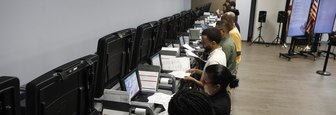The new COVID-19 booster shot, aimed at protecting against the latest variants, was approved for use by the Centers for Disease Control and Prevention on Friday, two days before the start of this week’s Economist/YouGov poll. The poll shows that three-quarters of Americans have heard at least something about the new booster, but only 36% want the booster or already got it. Consistent with previous findings on COVID, party differences are sizable: 60% of Democrats but only 23% of Republicans either say they want the booster or already got it.
The survey also asked more broadly about receiving a COVID-19 shot in 2023, alongside three other types of vaccines — for the flu, shingles, and RSV. One-quarter of Americans say they have received a COVID-19 shot this year, and an additional 21% say they haven't but plan to receive one. Half of Americans (50%) say they don't plan to get a COVID-19 shot this year. About half (54%) have already or plan on getting a flu shot this year; 42% say they don't plan to get a flu shot. Far fewer have or plan to get vaccines for shingles (28%) or RSV (19%).
In addition to predicting COVID-19 vaccination plans, party affiliation also is tied — though not as strongly — to Americans' intentions to receive other types of vaccines this year, including the flu vaccine (65% of Democrats have had it or plan to vs. 51% of Republicans), the shingles vaccine (37% vs. 28%), and the RSV vaccine (26% vs. 17%).
Republicans' lower willingness than Democrats' to be vaccinated for certain diseases may be caused in part by their having less concern about contracting the diseases asked about. Our survey finds that Republicans are far less likely than Democrats to express worry about experiencing COVID-19 in the future, and also less concerned about the possibility of contracting the flu, RSV, and shingles. The party differences for concern about those three diseases are smaller than for COVID.
See the toplines and crosstabs from the Economist/YouGov poll conducted on September 10 - 12, 2023 among 1,500 U.S. adult citizens.
Methodology: Respondents were selected from YouGov’s opt-in panel using sample matching. A random sample (stratified by gender, age, race, education, geographic region, and voter registration) was selected from the 2019 American Community Survey. The sample was weighted according to gender, age, race, education, 2020 election turnout and presidential vote, baseline party identification, and current voter registration status. Demographic weighting targets come from the 2019 American Community Survey. Baseline party identification is the respondent’s most recent answer given prior to November 1, 2022, and is weighted to the estimated distribution at that time (33% Democratic, 31% Republican). The margin of error for the overall sample is approximately 3%.
Image: Pexels (Nataliya Vaitkevich)













